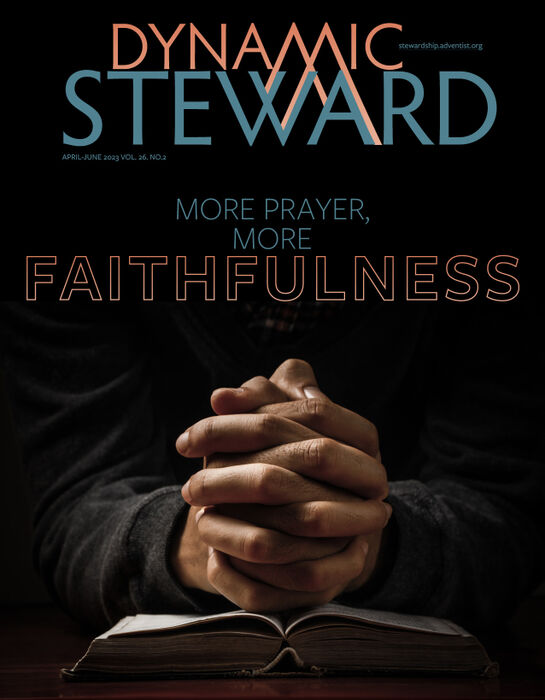The Offering as a Contribution[1]
A word frequently used to refer to offerings is terumah, which means “contribution” (Numbers 18:8, 19; Leviticus 22:12).[2]
Terumah probably comes from the root hifil of the verb rum, which means “to raise, to lift,”[3]
and it refers to the act of setting aside a portion and allocating it for a specific purpose. When a believer sets aside a portion of his or her belongings and allocates it to a sacred purpose (for instance, to further God’s mission), he or she is consecrating that portion.
A contribution implies the existence of a common fund or collection for a definite purpose. Offerers contribute to that collection because they believe in its purpose and want to promote it and add their resources to the project. For instance, the children of Israel identified themselves with God’s mission by generously giving offerings to build the temple, to the point where they were asked not to bring any more contributions (Exodus 35, 36). This description of offerings takes us beyond an expression of love (a gift) and acknowledgment (a tribute) to one of support. A contribution entails the giver’s commitment to God’s mission on earth. Offerers are now collaborators with God, and as partners, not only do they partake of the challenges and difficulties of the divine enterprise, but they also take part in its accomplishments and rewards.
In a similar way, certain offerings or parts of them were described with the word tenupha, which means “waved” or “raised offering.”[4] The offering was swung, or raised, toward the altar before being burned.[5] That gesture was an act of consecration. The waved offering was being appointed for a special use.[6] In fact, Numbers 8:11–21 presents the Levites as an offering to God. They had been set aside from among the children of Israel and had been consecrated to God’s service, and now they belonged to Him (verse 14). Levites were the offering the children of Israel had given as a contribution to God’s mission on earth.
We Should Give with Spiritual Understanding
Offerings are our contribution to God’s mission on earth. When we give our offerings, we not only show God our love, devotion, and gratitude, but also give evidence of our commitment to His work in this world; we become His partners and cooperate with Him (1 Corinthians 3:9).
God has allocated His resources among His children with the specific purpose that they contribute to the furthering of His work.[7] The apostle Paul says God’s children should be filled with the knowledge of God’s will, and this is possible through “wisdom and spiritual understanding,” in other words, through wisdom and understanding given by the Spirit (Colossians 1:9).[8]
God provided for Paul’s needs in Thessalonica through monetary contributions made by believers in Philippi (Philippians 4:10–19). Paul explained, however, that the donations that were sent to sustain him in the work of the gospel were received by God as a “sweet-smelling aroma, an acceptable sacrifice, well pleasing to God” (verse 18). Likewise, God provided for the needs of the church in Jerusalem through the offering Paul collected in the churches of the Gentiles (Romans 15:25–27; 2 Corinthians 8, 9). Believers need to learn to hear the Spirit’s voice in order to give with wisdom and spiritual understanding.
Let us pay heed to this inspired statement:
God in His wise plans has made the advancement of His cause dependent upon the personal efforts of His people and upon their freewill offerings. By accepting the co-operation of man in the great plan of redemption, He has placed a signal of honor upon him. The minister cannot preach except he be sent. The work of dispensing light does not rest upon ministers alone. Every person, upon becoming a member of the church, pledges himself to be a representative of Christ by living out the truth he professes. The followers of Christ should carry forward the work which He left for them to do when He ascended into heaven.[9]
[1] Taken from Félix H. Cortez, God Will Provide: Tithes, Offerings, and Our Spiritual Life (Doral, FL: IADPA, 2021), 87, 88, 101, 102.
[2] Ludwig Koehler et al., Hebrew and Aramaic Lexicon of the Old Testament, vol. 4 (Leiden, Netherlands: Brill, 1999), 1788, 1789. It occurs 76 times in the Old Testament; see L. Wächter and T. Seidl, “Terumah,” Theological Dictionary of the Old Testament, vol. 15 (Grand Rapids: Eerdmans, 2006). 771.
[3] L. Wächter and T. Seidl, “Terumah,” p. 771
[4] Roy Gane, The NIV Application Commentary: Leviticus, Numbers (Grand Rapids: Zondervan, 2004), 156, suggests “raised offering.”
[5] Exodus 29:24; Leviticus 7:30, 34; 8:27, 29; 9:21; 10:14,15; 14:12, 21, 24; 23:15, 17, 20; Numbers 6:20; 18:11, 18.
[6] For example, a portion of the peace offering was dedicated or consecrated to the priests by waving it or raising it (Leviticus 7:28–36). Other passages that relate this offering with the concept of consecration are Exodus 29:22–24, 26, 27; 35:22; 38:24, 29.
[7] See Testimonies for the Church, vol. 4 (Mountain View, CA: Pacific Press Pub. Assn., 1876), 463.
[8] All Scripture quotations are from the New King James Version®. Copyright © 1982 by Thomas Nelson. Used by permission. All rights reserved.
[9] Ellen G. White, Testimonies for the Church, vol. 4 (Mountain View, CA: Pacific Press Pub. Assn., 1876), 464).


